
Opportunity Details
During these sessions, representatives of funder organizations will be matched to participating ESOs to provide direct feedback on their pitches - what resonates, what's missing, and where there are opportunities to grow. ESO leaders have been assured that these sessions are for feedback only.Agenda: We’ll start with brief introductions from the ESOs themselves, then break into small groups. Please come prepared to do a brief introduction of yourself and your organization. As a part of your introduction, we’d love for you to share “What I wish potential grantees knew before engaging with us.” Following this brief introduction, ESOs will ask you more about your grantmaking process/approach. There is a guide below on questions they will be likely to ask. This will be followed by a brief group report out.
Available Shifts
| Shift Name | Signup Max | Start | End |
|---|---|---|---|
| General | 5 | n/a | n/a |

Opportunity Details
HBIC HQ (Head Boss in Charge) is a nonprofit for women dedicated to see more Women Owned Businesses drive our future. Our charitable programs support women-identified persons who are survivors of domestic abuse or homelessness, former foster youth, or have faced other adversities. We are looking for a dynamic Social Media & Marketing Manager volunteer to help us achieve our mission by creating social media content, scheduling posts, and designing campaigns to maximize our outreach so we can help as many individuals as possible.Position Objective:
This role will direct the marketing schedule for event promotions, social media postings, and press releases to drive community engagement and allow each opportunity ample time for growth and development. Additionally, this role will work with the Executive Director and Board of Directors on multiple projects across the organization.
Position Description:
• Create, implement, and manage the Social Media Content Calendar for each event across all channels of the organization’s social media.
• Create and execute an actionable plan to continuously engage the community in our organization’s event schedules.
• Working in partnership with the board of Directors, delegate supporting tasks to members to ensure the workload is manageable.
• Advise Board Members on new or trending social media outlets to create a broader audience and engage potential sponsors.
• Create social media content for posting and distribution according to the growth and needs of each event on cue.
• Develop press releases for each event with a distribution schedule, directing the committee members to prioritize release channels.
Position Requirements:
• 2-3 years social media and marketing experience, preferably for a non-profit
• Experience executing a growth-driven strategy on social media platforms
• A strong understanding of social metrics
• Excellent communication and writing skills
• Proficient with social media and press release scheduling
Some of the benefits of your time include working with a team of dedicated professionals who are well respected in their roles and in the community, an entry into the event(s) in which you are assisting with, a resume enhancing experience that will elevate your current position, and the gratitude of many people who will benefit from your work for a great cause – time well spent!
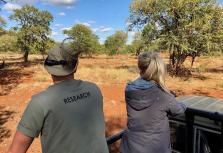
Opportunity Details
Our research work relies on the support and financial assistance of passionate individuals.The Selati Research Volunteer Programme invites high-school and tertiary students, GAP year individuals, and researchers to join us on a quest to understand how to protect and manage this closed ecosystem. We also, keep one space open for a digital marketing/fundraising/multi-media volunteer, who can assist us with our social media and assist with educating the public about our fantastic projects. By getting involved in our ongoing research projects and monitoring programmes, you will enjoy an uplifting, conservation-based wildlife experience, including:
Hands-on fieldwork (monitoring wildlife and collecting data)
Authentic engagement with a small group of passionate people
Exposure to wildlife experts and day-to- day wildlife management practices
An opportunity to contribute towards building a conservation legacy, and to explore the role of conservation within a complex developed world.
The Programme also caters for those who have their own personal projects and need to do practical field work as part of their post-graduate course requirements. If you are interested in seeing if we can accommodate your needs please get in touch at wildlife@selatigamereserve.co.za.
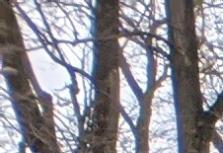
Opportunity Details
Help us tidy up a property under development. Lots of yard work, painting, removeal of old carpet. Come lend some sweat equity!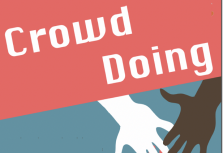
Opportunity Details
Wildfire Prevention environmental science knowledge analyst, CrowdDoingPrevention derivatives is driven by the thesis that there is an under-valuation of passive risk (or the cost of inaction) and an under-prioritization of positive risk. Correspondingly for wildfires as an example, there is an under-recognition of the potential shared value upside of preventative action through social innovation and social interventions (such as goats & sheep that prevent wildfires). CrowdDoing.world's aim is to guarantee positive risk through leveraging existing liabilities to allow for the implications of prescriptive analytics to be financed. The under-pricing of passive risk means that liabilities are treated as either costs of doing business or un-predictable risks even for entirely preventable risks. Risk management offices have been too biased towards avoiding taking the wrong risks rather than ensuring that institutions make their own luck by seizing the abundant positive risk opportunities in social innovation. Meanwhile, the bias against positive risk leaves social innovations not to get adopted even if there would be remarkable benefits to all stakeholders if they were adopted
Wildfire Prevention environmental science knowledge analyst, CrowdDoing
1. Identify and collect data relevant to assigned project (e.g., Forest Fire Prevention, Biophelia in Hospitals, Crypto Impact Potential)
2. Establish costs incurred by target stakeholders as a result of select threat(s) (e.g., wildfire)
3. Develop recommended solutions based on analysis, cite resources
4. Present findings.
https://drive.google.com/file/d/1jx3iv8LETHC2MaAS7bSY_XScup0aTVXk/view?usp=sharing
If you have any questions about processes for joining CrowdDoing.world as a volunteer to support our efforts in systemic change please write to volunteerorientation@crowddoing.world
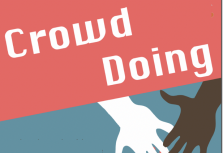
Opportunity Details
Wildfire Prevention Financing Data Analyst- CrowdDoing Volunteer-Prevention derivatives is driven by the thesis that there is an under-valuation of passive risk (or the cost of inaction) and an under-prioritization of positive risk. Correspondingly for wildfires as an example, there is an under-recognition of the potential shared value upside of preventative action through social innovation and social interventions (such as goats & sheep that prevent wildfires). CrowdDoing.world's aim is to guarantee positive risk through leveraging existing liabilities to allow for the implications of prescriptive analytics to be financed. The under-pricing of passive risk means that liabilities are treated as either costs of doing business or un-predictable risks even for entirely preventable risks. Risk management offices have been too biased towards avoiding taking the wrong risks rather than ensuring that institutions make their own luck by seizing the abundant positive risk opportunities in social innovation. Meanwhile, the bias against positive risk leaves social innovations not to get adopted even if there would be remarkable benefits to all stakeholders if they were adopted
Data science will be utilized in the following ways:
Explore/Visualize data currently available on Wildfires
Identify trends and patterns in Historical data
Quantify historical losses in dollars based on property destruction, casualties, acres burnt, etc.
Build predictive models to identify areas of high wildfire risk based on factors such as weather, vegetation, topography, etc.
Visualization of Model outcomes
Scenario building (changing input variables and observing impact on outcome)
Tools - R, Python, MATLAB, SQL, PowerPoint
Knowledge or Interest in anyone or more:
Programming for Data Science
Mathematics
Statistics
Predictive Analytics
Prescriptive Analytics
Machine Learning - Supervised/Unsupervised learning
Artificial Intelligence
Data Mining
Computer Science
Monte Carlo Simulations
Expectations:
Identify papers on Simulation of Wildfires, Catastrophe Modeling
Review and present Technical papers in a way that everyone can understand
Assist in Model development and testing by contributing in finding data and programming
Identify/Collect data relevant to wildfire Impact
Work cross-functionally
Traits:
Mathematically inclined, highly analytical, creative problem solver, can conduct analyses independently or with minimal supervision
If you have any questions about processes for joining CrowdDoing.world as a volunteer to support our efforts in systemic change please write to volunteerorientation@crowddoing.world
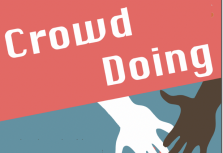
Opportunity Details
Fortune 500 Risk Simulation based on PGE Bankruptcy Data for Wildfire RiskPrevention Derivatives draws upon the annual recurring expected losses of Fortune 1000 companies. It would be helpful to do more with the data on the PGE bankrupsy to fully simulate the 75 Fortune 500 companies that expect that loss to recur at 2.5% to 10%.
-Prevention derivatives is driven by the thesis that there is an under-valuation of passive risk (or the cost of inaction) and an under-prioritization of positive risk. Correspondingly for wildfires as an example, there is an under-recognition of the potential shared value upside of preventative action through social innovation and social interventions (such as goats & sheep that prevent wildfires). CrowdDoing.world's aim is to guarantee positive risk through leveraging existing liabilities to allow for the implications of prescriptive analytics to be financed. The under-pricing of passive risk means that liabilities are treated as either costs of doing business or un-predictable risks even for entirely preventable risks. Risk management offices have been too biased towards avoiding taking the wrong risks rather than ensuring that institutions make their own luck by seizing the abundant positive risk opportunities in social innovation. Meanwhile, the bias against positive risk leaves social innovations not to get adopted even if there would be remarkable benefits to all stakeholders if they were adopted
In the framework of Prevention Derivatives, we want to create a predictive machine learning (ML) model that for a given geographical region will estimate likely savings (losses) due-to protection (damages) of stakeholders’ properties, business profits, common health, and regional ecology resulting in applying risk prevention solutions (or doing nothing instead). Goal of these notes is to analyze ML model’s design, offer a potential improvement and to discuss existing approaches for data collection, and training and testing the model. It is important to notice that the model is applied to the entire selected or target region. Therefore, a geographical region R is the smallest unit we apply modeling to.
Data science will be utilized in the following ways:
Explore/Visualize data currently available on Wildfires
Identify trends and patterns in Historical data
Quantify historical losses in dollars based on property destruction, casualties, acres burnt, etc.
Build predictive models to identify areas of high wildfire risk based on factors such as weather, vegetation, topography, etc.
Visualization of Model outcomes
Scenario building (changing input variables and observing impact on outcome)
Tools - R, Python, MATLAB, SQL, PowerPoint
Knowledge or Interest in anyone or more:
Identify papers on Simulation of Wildfires, Catastrophe Modeling
Review and present Technical papers in a way that everyone can understand
Assist in Model development and testing by contributing in finding data and programming
Identify/Collect data relevant to wildfire Impact
Work cross-functionally
Traits:
Mathematically inclined, highly analytical, creative problem solver, can conduct analyses independently or with minimal supervision
Programming for Data Science
Mathematics
Statistics
Predictive Analytics
Prescriptive Analytics
Machine Learning - Supervised/Unsupervised learning
Artificial Intelligence
Data Mining
Computer Science
Monte Carlo Simulations
Expectations:
If you have any questions about processes for joining CrowdDoing.world as a volunteer to support our efforts in systemic change please write to volunteerorientation@crowddoing.world

Opportunity Details
Positive Risk Management/Opportunity Management Literature Reviewer, Wildfire Prevention CrowdDoingPrevention Derivatives draws upon "positive risk" and "opportunity management". We are scaling this sector up. Reviewing the literature here could be helpful.
-Prevention derivatives is driven by the thesis that there is an under-valuation of passive risk (or the cost of inaction) and an under-prioritization of positive risk. Correspondingly for wildfires as an example, there is an under-recognition of the potential shared value upside of preventative action through social innovation and social interventions (such as goats & sheep that prevent wildfires). CrowdDoing.world's aim is to guarantee positive risk through leveraging existing liabilities to allow for the implications of prescriptive analytics to be financed. The under-pricing of passive risk means that liabilities are treated as either costs of doing business or un-predictable risks even for entirely preventable risks. Risk management offices have been too biased towards avoiding taking the wrong risks rather than ensuring that institutions make their own luck by seizing the abundant positive risk opportunities in social innovation. Meanwhile, the bias against positive risk leaves social innovations not to get adopted even if there would be remarkable benefits to all stakeholders if they were adopted
In the framework of Prevention Derivatives, we want to create a predictive machine learning (ML) model that for a given geographical region will estimate likely savings (losses) due-to protection (damages) of stakeholders’ properties, business profits, common health, and regional ecology resulting in applying risk prevention solutions (or doing nothing instead). Goal of these notes is to analyze ML model’s design, offer a potential improvement and to discuss existing approaches for data collection, and training and testing the model. It is important to notice that the model is applied to the entire selected or target region. Therefore, a geographical region R is the smallest unit we apply modeling to.
Data science will be utilized in the following ways:
Explore/Visualize data currently available on Wildfires
Identify trends and patterns in Historical data
Quantify historical losses in dollars based on property destruction, casualties, acres burnt, etc.
Build predictive models to identify areas of high wildfire risk based on factors such as weather, vegetation, topography, etc.
Visualization of Model outcomes
Scenario building (changing input variables and observing impact on outcome)
Tools - R, Python, MATLAB, SQL, PowerPoint
Knowledge or Interest in anyone or more:
Identify papers on Simulation of Wildfires, Catastrophe Modeling
Review and present Technical papers in a way that everyone can understand
Assist in Model development and testing by contributing in finding data and programming
Identify/Collect data relevant to wildfire Impact
Work cross-functionally
Traits:
Mathematically inclined, highly analytical, creative problem solver, can conduct analyses independently or with minimal supervision
Programming for Data Science
Mathematics
Statistics
Predictive Analytics
Prescriptive Analytics
Machine Learning - Supervised/Unsupervised learning
Artificial Intelligence
Data Mining
Computer Science
Monte Carlo Simulations
Expectations:
If you have any questions about processes for joining CrowdDoing.world as a volunteer to support our efforts in systemic change please write to volunteerorientation@crowddoing.world

Opportunity Details
Exploring New Horizons (ENH) seeks board members to help support our San Francisco Bay Area outdoor education non profit. Board members serve as advocates of ENH, meet 4 times a year, serve on a committee, and support the organization with time and or financial donations.Currently, ENH is specifically seeking board members with a background in fundraising, financial management, and with a legal background.
Please contact ENH Executive Director, Jacob Sackin, if interested. jacob@exploringnewhorizons.org
Available Shifts
| Shift Name | Signup Max | Start | End |
|---|---|---|---|
| General | no limit | n/a | n/a |

